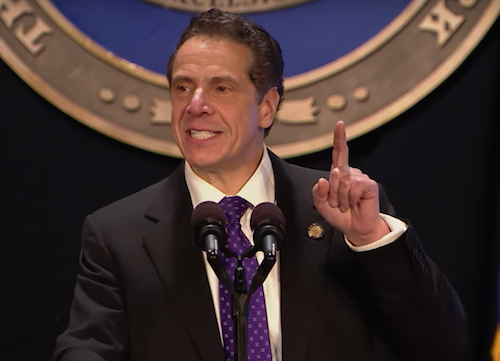Despite intense lobbying from Central Brooklyn lawmakers and pleading attorneys fighting the tide against dozens of foreclosures auctioned off every Thursday in Brooklyn courts – and in counties around the state, Gov. Andrew Cuomo is mum on pending legislation on his desk to address the issue – one way or the other.
In the last week alone, City Council Member Robert Cornegy (D-Bedford-Stuyvesant, Northern Crown Heights) has re-upped his call for Cuomo to sign the measure, and the New York State Foreclosure Defense Bar and the Empire Justice Center both fired off letter s to Cuomo pressing him to sign a bill (A.5619/S.5160) that would protect defendants in foreclosure court from a loop-hole in regards to raising the defense of “standing.”
Since last week, KCP has emailed and called Cuomo’s press office several times on where the governor stands on the legislative issue and has yet to receive any kind of answer – even a perfunctory “No comment on pending legislation” response.


The measure, which Assemblymember Helene Weinstein (D-Flatlands, Sheepshead Bay) and State Sen. Brian Kavanagh (D-Northern Brooklyn, Lower Manhattan) sponsored in their respective chambers, clarifies Article 13 in Real Property Actions & Proceedings, of which the legislature wrote in the 2008 sponsor’s memo that “it is critically important that those who initiate a foreclosure action actually have standing to do so.”
The issue of “standing” pertains to the question of who is the defendant’s actual creditor, and whether the plaintiff in foreclosure court truly owns the property’s mortgage note and whether they have actual “standing” to sue to foreclose.
After someone takes out a mortgage for a property, lenders can sell the mortgage notes to private equity firms and other unknown buyers, and as a result, the property owner may have little to no idea as to who actually owns their mortgage anymore.
Despite Article 13’s requirement for standing, the courts do not require plaintiffs to provide specifics on how they own the mortgage, according to a June 18 memorandum in support of the bill by the New York State Foreclosure Defense Bar.
“The standing bill reaffirms that every property owner in the state has a fundamental constitutional right to know who’s really suing them to take their property. The homeowner cannot identify who is the actual party on the loan because the current application of the law doesn’t facilitate this identification, and the actual creditor isn’t obligated to appear and participate in settlement conferences in good faith.” said Yolande Nicholson, attorney at the New York State Foreclosure Defense Bar.
The letters from the Empire Justice Center and New York State Foreclosure Defense Bar, sent on Dec 17, outline the reasons why the legislation is important.
“Allowing a plaintiff who is not the lawful owner and holder of the note to proceed to a judgment and auction on someone’s home cannot stand as the law in New York State,” the Empire Justice Center wrote.
As the law stands, if the defendant doesn’t know who actually owns their mortgage and wants to challenge their plaintiff’s standing, they can only do so by the first hearing. If they don’t raise the issue of standing in a timely fashion, after being served, they lose the chance to bring it up again later on in the court process.
There are a couple reasons why a defendant would fail to raise the issue of standing in their first answer to the court, according to the Empire Justice Center. They may lack sufficient information to challenge the standing upfront, given that answers are due within 20 to 30 days of being served with the complaint. Another, more common reason is they may not have legal counsel.
“In this regard, RPAPL sec. 1302 functions as a “gotcha” statute – because of a technical error, a homeowner risks losing their home to the wrong party,” the Empire Justice Center’s letter states.
Empire Justice Center calls the foreclosure proceeding a judgement and sale to the wrong party a “travesty of justice,” and traces the issue back to the 2008 mortgage crisis, when following “the rapid, often faulty buying and selling and assignments of mortgages notes among investors, it was not uncommon that the wrong party brought a foreclosure action against a homeowner.”
“This legislation makes clear to the court what is necessary. The homeowner has a fundamental right to know, address and challenge a party seeking to collect on the note in a foreclosure proceeding,” Nicholson said.
Also strongly supporting the bill is Assemblymember Tremaine Wright (D-Bedford-Stuyvesant, Northern Crown Heights), whose district has also been rocked with a large amount of foreclosures. “I fully support the bill and hope to have it signed by the governor so that we can protect the rights of small homeowners,” she said.
Both letters arrive after 26 councilmembers co-signed another letter, Cornegy sent to Cuomo’s office on October 21, also urging the governor to sign the legislation once it got to his desk.
According to the State Senate website, the legislation was delivered to Cuomo for his signature yesterday. He has 30 days to sign it, and if he continues to ignore it, then the measure becomes what is known as a pocket veto, which in effect is a veto.






